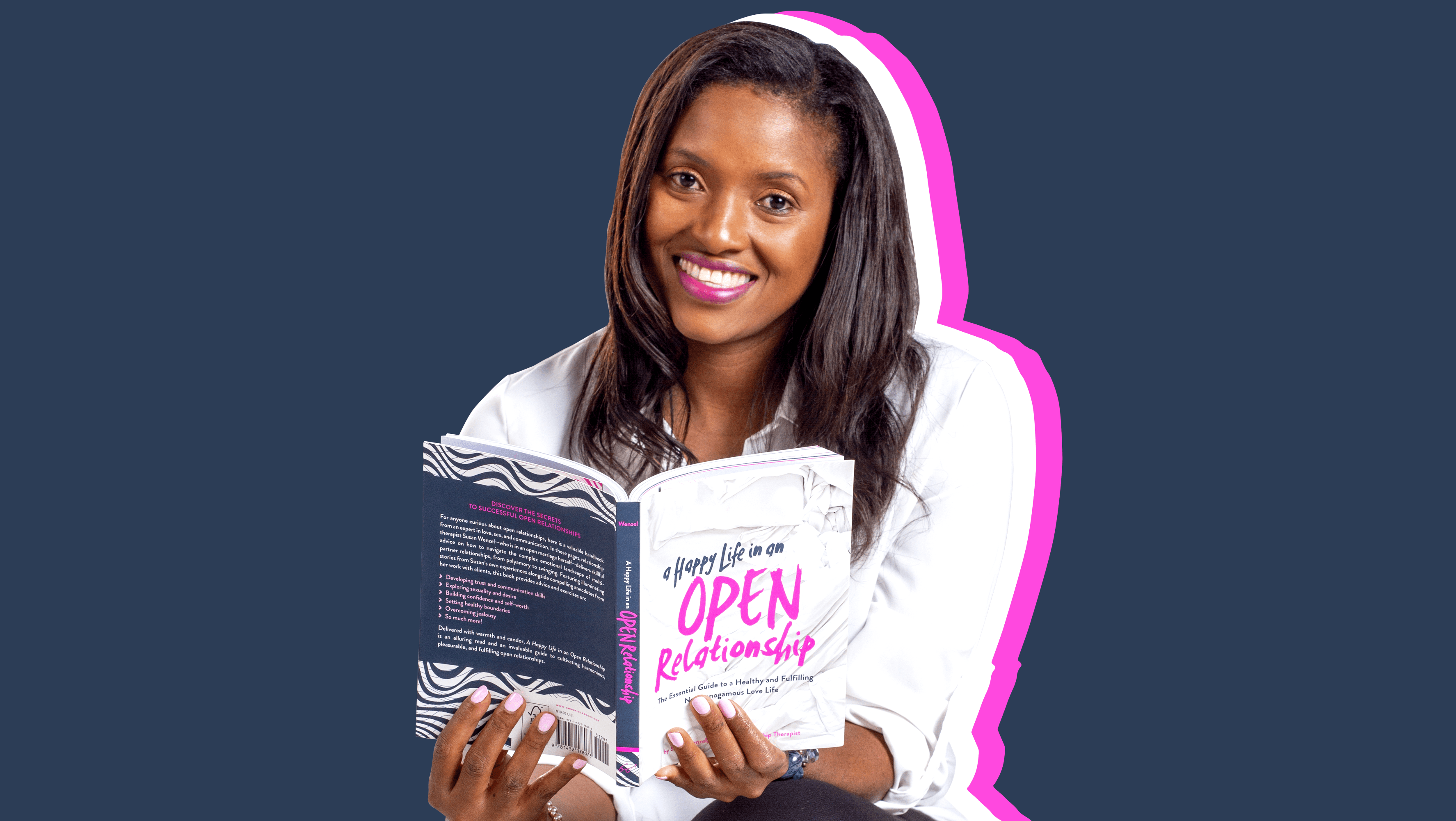How do you know if you’re non-monogamous? Is jealousy normal? How do you talk to your partner about opening your relationship—and what if they say no? These are the questions that Susan Wenzel, a certified sex therapist in Winnipeg, Man., explores in her upcoming book A Happy Life in an Open Relationship: The Essential Guide to a Healthy and Fulfilling Nonmonogamous Love Life.
Wenzel, who is bipoly—a person who is bisexual and polyamorous—was featured alongside her husband in a 2017 New York Times article titled, “Is an Open Marriage a Happier Marriage?” While her book provides skillful advice and exercises for how to navigate the world of open relationships, she also shares her own experience: One year into dating her now-husband, he asked if she’d consider an open relationship. Wenzel, who had been monogamous until that point, agreed, and says it’s positively changed her life—and strengthened her relationship.
Wenzel spoke to Xtra about how to talk to your partner about opening up your relationship, and what to expect when on the path to consensual non-monogamy.
What is consensual non-monogamy?
Consensual non-monogamy is first about “consenting”—you’re not doing it behind your partner’s back. Your partner is aware of what’s going on; you have both agreed to it and set some boundaries, and you’re seeing other people with your partner’s permission and awareness. It’s the opposite of an affair, which is about sneaking around and violating your partner’s trust.
How do you know if you are non-monogamous?
People who desire other people when they’re still in monogamous relationships, or have a history of desiring other people while in a committed relationship that is monogamous, is one way of knowing. There are also people who really like freedom and love autonomy and feel restricted by [monogamy]—they love their partner but really feel that they still desire other people. And some people don’t know they’re non-monogamous until they’re presented with that option; that’s when they realize they are.
How should you approach telling your partner that you want to open up your relationship?
I would say have the discussion when you’re in a good place—not during a fight—and when your partner is not feeling threatened. The most important thing is that before you approach the subject, you let your partner know that you really care about them, that you really want to be with them and that it has nothing to do with not liking or loving them, but that these are just your needs.
I would also say you can start initiating watching shows or reading books that have to do with open relationships—that’s a subtle and general way of starting a discussion with your partner. That opens up the chance to ask, “What are some of your fears about opening our relationship?” And they may say, “My fear is that you’re going to leave me for someone else.” That’s an opportunity to reassure that person about your commitment. This is especially important if talking about non-monogamy is really new to your partner or you haven’t had this conversation before—they might not even know what you’re talking about.
But what if they say no—is the relationship doomed?
I would say no. In fact, it’s unrealistic to expect your partner would say yes right away. In my own experience, I hated the whole idea for months. But giving your partner time to process is huge. They are rewiring their brain in terms of how they’ve done relationships and how they’ve seen relationships work. So if they say no, that’s okay: Respect their space and ask them if you could revisit the topic on another day or time. Expect that they may not just jump into agreeing—that’s part of the process. The more you keep loving them and sending the message of “I do care about you, I do love you and this commitment is going to continue even when we open the relationship” gives you a better chance.
Unless your partner has also been thinking about non-monogamy, it may take years. It may take months. It may take weeks. But every step along the way you will grow and so will your relationship. You may also never have a full, open polyamorous lifestyle, but your partner may allow for a threesome. They may allow for you to go to a sex club. So it may lead to a different conversation about an open relationship, but at least there’s some movement.
If you’re non-monogamous, is it normal to still feel jealousy? How do you overcome it?
Jealousy is inevitable for everybody, whether you’re in a monogamous or non-monogamous relationship, and it’s based on your insecurities. For example, I would experience jealousy if my partner was dating someone who loves politics, which is not my interest, and I’d notice how their conversation would flow when we’d all be sitting together. So I’d have to catch myself and realize that I’m jealous and that’s okay—it’s not unhealthy, I’d just need to remind myself that they connect in that way and I connect with him in another way. That kept the jealousy from getting out of hand.
For me, non-monogamy has helped me deal with my jealousy and abandonment issues. I now know that I am enough even if my partner wants to go out with other people—my “enoughness” isn’t based on any external things—it’s based internally, on who I am. Even though it’s a lot of work, it’s such freedom to not have to worry about those things anymore.
You may find that you’re feeling jealousy because of areas that you don’t feel comfortable or confident in, or that you’re insecure about. Ask yourself: “What is it about me that’s causing me to feel this way about this situation?” “What is it saying about me?” “Where am I not feeling as strong or confident?” Whether it’s fear of abandonment or fear of not feeling good enough, identifying the root cause of your insecurity may help with your jealousy.
What’s the biggest hurdle to overcome in the beginning of an open relationship?
For me, and maybe for others, it was rewiring my brain to stop thinking of monogamy as being the only way to be happy. We are raised being told that monogamy is the way to happiness, to find your Prince Charming or Princess and live forever. So having to rethink that can be very difficult for most people because it’s so ingrained in your childhood from all the cartoons and Disney movies that you watched. Even in a few Netflix shows I’ve watched [with open couples], most of them end horribly—can there not be a nice open relationship/ polyamorous show or movie where couples actually end up very happy?
Another hurdle is overcoming the fear of the unknown: Because there’s not a lot of good [mainstream] examples where open relationships work well, a lot of people are going into them making their own path. The more that open relationships become commonplace, the easier it might become for the next generation.
How do you tell your friends, family and/or children that you are non-monogamous? Do you even need to?
My husband and I were afraid to tell our friends. But most of them have become so supportive, even if they’re in monogamous relationships. And this is because they see that we really are happy in our relationship and individually as our own selves.
At the time I wrote the book, we had not shared that we were open with our children. Like most open parents, I was scared about what my children would say. But two years ago, we told them and they were surprisingly very open. More than what we’re doing, they want to know if we’re happy, and if this is going to cause issues in our relationship. But they know me and my husband love each other and they see the love that is there. Children are so open and receptive, especially when you tell them things in a way that is confident and loving.
I think it’s so important to talk to your kids about being non-monogamous, especially for polyamorous people who bring their partners into their home, because you don’t want your kids to be seeing daddy or mommy kissing someone else without first having that conversation.
What surprised you most about becoming non-monogamous?
That I prefer it to monogamy; I like all the benefits that it brings to my life. I would say I love how fluid my sexuality has become. I celebrate that, especially as a sex therapist. I find it so important for me to really be more authentic in my sexuality. It’s something that I didn’t realize how much I needed.
The one thing I didn’t pursue while monogamous was women. I knew I found women attractive, sexually, but I knew that there was no way I would have been in a monogamous relationship with a woman. Coming from a religious background and from how I was raised, I couldn’t even entertain the idea of being with a woman. So when my husband and I opened our relationship, it gave me an opportunity to explore both men and women. Being bipoly, I seek men and women, but I prefer women.
For someone looking to open their relationship, what’s your best piece of advice?
Go into it open minded and question some of those [preconceived beliefs about non-monogamy] you’ve been holding on to, especially if monogamy hasn’t been working for you.
Ask yourself: “Why am I holding so tightly to these beliefs instead of questioning them?” “Is it okay to question some of those things that we hold on to for so long, especially when they aren’t serving us?” “What if I look at this differently?” I have seen some of my clients let go of good relationships because their partner wanted to open their relationship—all without ever asking themselves, “Why am I so stuck in my own beliefs?”
Open relationships are not for everybody. It may be for the two of you, and it may not, and that’s okay—but at least you tried and now you know why it didn’t work.
A Happy Life in an Open Relationship is available March 10. You can pre-order now.


 Why you can trust Xtra
Why you can trust Xtra


